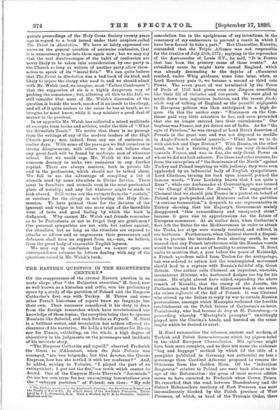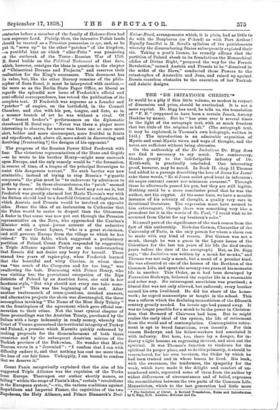'THE EASTERN QUESTION IN THE EIGHTEENTH CENTURY. 0 Orr the reappearance
of the eternal Eastern question in an acute shape after "the Bulgarian atrocities," M. Sorel, now -so well known as a historian and critic, won his preliminary spurs by a study of the partition of Poland and the Empress Catharine's first war with Turkey. M. Thiers and some ether French historians of repute knew no language but -their own. Their successor considered it his duty to draw from the foreign researches which have revolutionised our knowledge of these topics; the exception being that he ignores Russians like Solovief, and such Swedes as Fryxell. M. Sorel is a brilliant writer, and translation has seldom affected the clearness of his narrative. He holds a brief neither for Russia nor for France, exhibiting, on the whole, a high degree of objectivity in his judgments on the personages and incidents of his intricate story.
"The Empress Catharine and myself," observed Frederick the Great to d'Alembert, when the finis Polonim was arranged, "are two brigands ; but that devotee, the Queen. Empress, bow has she settled it with her confessor?" And, he added, writing to Voltaire, "I played the part of an extinguisher ; I put out the fire,"—a truth which cannot be denied. One of the Empress Maria Theresa's "Jeremiads" (to use her own term for her unremitting lamentations over the "unhappy partition" of Poland) ran thus : "My sole • The Eastern question in the Eighteenth Century: the Partition of Poland and the Treaty of Ifaieardji. By Albert Borel, of the Academia Fraroaile. Trans- lated by F. C. Bramwell, M.A. With a Preface by 0. B. L. Fletcher. London: ' Methuen and Co. consolation lies in the uprightness of my intentions, in the constancy of my endeavours to prevent a result in which I have been forced to take a part." Her Chancellor, Kannitz, contended that the Triple Alliance was not responsible for the treaties of July 25th, 1772; replying to the reproaches of the Ambassador of Louis XV., he said, "It is France that has been the primary cause of these events." As subsidiary cause he might have named England, which was already descending to the depths of effacement reached, under Whig guidance, some time later, when, as Lord Rosebery puts it, we became a second or third rate Power. The seven years of war terminated by the Peace of Paris of 1763 had given even our Jingoes something like their fill of victories and conquests. We were glad to settle down into inglorious isolation, and the recent fin-de. siècle way of talking of England as the quantite negligeable in European politics was then anticipated in a high de- gree. On this the author says : "Statesmen on the Con- tinent paid very little attention to her, and even pretended that she no longer entered into their calculations." Our bugbear was France, not yet driven out of India. As for "the ogre of Potsdam," he was enraged at Lord Bute's desertion of Prussia in the great war, and was not disposed to meddle in Anglo-French colonial quarrels,—" What have we to do with cod-fish and Cape Breton? " With Russia, on the other hand, we had a thriving trade, she was very ill-inclined towards France, and was, in fine, the only Great Power on whom we did not look askance. For these and other reasons, far from the enterprises of "the Semiramis of the North" against Turkey and Poland inspiring us with jealousy, they were even applauded by an influential body of English sympathisers. Lord Chatham, turning his back upon himself, penned the famous words, "Your Lordship knows that I am quite a Russ "; while our Ambassador at Constantinople was termed "the Chargé d'Affaires for Russia." The suggestion of Choiseul that we should join France in a protest on behalf of Poland was pooh-poohed, and Ministers called the partition "a curious transaction," a despatch to our representative in Turkey showing that his Majesty's Government mainly disapproved "this extraordinary and unexpected event" because it gave rise to apprehensions for the future of European commerce. At an earlier date, when Catharine's fleet left the Baltic for the Mediterranean in order to attack the Turks, her ships were warmly received, and refitted, in our harbours. Furthermore, when Choiseul showed a disposi- tion to prevent the intruders from steering south, he was warned that any French interference with the Russian vessels would be treated as an act of hostility to ourselves. M. Sorel omits to mention that, a year before the peace of Kainardji, a French squadron sailed from Toulon for the archipelago, but was ordered to return lest the contemplated movement should lead to a rupture with Russia's faithful ally, Great Britain. Our author calls Choiseul an impatient, unstable, inconsistent Minister, who harboured designs too big for his means. He might almost have added, expanding the above remark of Kaunitz, that the enemy of the Jesuits, the Parliaments, and the Faction of Mistresses was, in one sense, the raison suffisante of the fall of Poland. It was Choiseul who stirred up the Sultan to reply by war to certain Russian provocations, amongst which Mustapha reckoned the forcible establishment on the Polish throne of Catharine's ex-lover, Poniatowsky, who had become de trop at St Petersburg,—a proceeding whereby " Mustapha's prompter" unwittingly played into the Czarina's hands, and harried on the cease trophe which he desired to avert.
M. Sorel summarises the schemes, ancient and modern, of Turkish and Polish dismemberment which lay pigeon-holed in the chief European Chancelleries. His epitome might have been more complete, and he does not name the elaborate "bag and baggage" method by which (if the title of a pamphlet published in Germany was authentic) no less a personage than Cardinal Alberoni proposed to remove the Ottomans from the Golden Horn. Of the "inductions dangerous" relative to Poland one went back almost to the age of the Reformation : the germ of their newest edition seems to have occurred to Frederick when Crown Prince. He remarked that the road between Brandenburg and the distant Hohenzollern territory of East Preussen was most inconsiderately blocked by the Polish province of West Preussen, of which, as head of the Teutonic Order, three centuries before a member of the family of Hohenzollern had been supreme Lord. Plainly, then, the intrusive Polish lands should be treated as a Prussian possession in ape, and, as he put it, "sewn up" to the other " patches " of the kingdom, —a youthful hint on which " alter-Fritz " was pondering on the outbreak of the Turco - Russian War of 1768. M. Sorel builds on the Political Testament of that date, which, however, consigns the ideas in question to the chapter of "Chimerical Dreams and Projects," and reserves their realisation for the King's successors. This document has its value, but, like the other literary remains of the philo- sopher of Sans Souci, it must be interpreted with caution,— the more so as the Berlin State Paper Office, so liberal as regards the splendid new issue of Frederick's official and semi-official correspondence, has vetoed the publication of its complete text. If Frederick was supreme as a founder and " patcher " of empire, on the battlefield, in the Council Chamber, and also with his pen, tongue, and flute, so in a meaner branch of art he was without a rival. Of that "honest broker's" performances on the diplomatic chessboard M. Sorel says : "Never was there a player more interesting to observe, for never was there one at once more alert, bolder and more circumspect, more fruitful in feints and expedients, and, above all, more adroit in discovering and deceiving [frustrating P] the designs of his opponent."
The progress of the Russian Power filled Frederick with fear. The victorious representatives of the Huns and Gepids —so he wrote to his brother Henry—might soon encroach upon Europe, and the only remedy would be "the formation, in course of time, of a league of the principal Sovereigns to resist this dangerous torrent." No such barrier was now attainable; instead of trying to stop Russia's "gigantic conquests," the plan must be "to endeavour by adroitness to profit by them." In these circumstances, the " patch " seemed to have a mere relative value. M. Sorel may not see it, but Frederick was greatly alarmed lest Maria Theresa's war with the Sultan should lead to a fourfold Oriental conflagration, in which Austria and Prussia would be involved on opposite sides. Hence the idea of an insinuation to Catharine that the Poles would be easier to despoil than the Ottomans. A feeler in that sense was now put out through the Prussian representative on the Neva, who approached the Czarina's Minister with a quasi - jocose account of the seductive dreams of one Count Lynar, "who is a great statesman, and still governs Europe from the village to which he has retired." To this fable, which suggested a preliminary partition of Poland, Count Panin responded by suggesting a Triple Alliance against Turkey on the understanding that Russia did not desire any booty for herself. There ensued two years of rapier-play, when Frederick learned that the beautiful and witty Czarina, in whom there was "too much of the Cleopatra and for too long," was swallowing the bait. Discussing with Prince Henry, who was visiting her, the provisional occupation of the Zips districts of Poland by an Austrian force, she said in her facetious style, "But why should not every one take some- thing too?" This was the beginning of the end. After another twelvemonth of cross-questions, crooked answers, and alternative projects the skein was disentangled, the three accomplices invoking "The Name of the Most Holy Trinity" on the frontispiece of the agreement which gave official con- secration to their crime. Not the least cynical chapter of these proceedings was the Austrian Treaty, purchased by the Satan with a large indemnity in ready money, whereby the Court of Vienna guaranteed the territorial integrity of,Turkey and Poland, a promise which Kaunitz quickly redeemed by making proposals for the dismemberment of both those countries and by the subsequent Austrian seizure of the Turkish province of the Bukowina. No wonder that Maria Theresa wrote in a " Jeremiad" : "I confess that I can with difficulty endure it, and that nothing has cost me more than the loss of our fair fame. Unhappily, I am bound to confess that we deserve it."
Count Panin categorically explained that the aim of his suggested Triple Alliance was the expulsion of the Turks from Europe. Thereupon our author shortly names, as falling" within the scope of Panin's idea," certain "revolutions In the European system,"—viz., the various coalitions against Republican and Imperial France, the captivities of the two Napoleons, the Holy Alliance, and Prince Bismarck's Drei- Saiser-Buncl, arrangements which, it is plain, bad as little to do with the Bosphorus (or Poland) as with Port Arthur ! Equally fanciful is M. Sorel's syllabus of the punishments whereby the dismembering States subsequently expiated their sin. Taking a poet's license, he roundly affirms that the partition of Poland shook to its foundations the Monarchical edifice of Divine Right, "prepared the way for the French Revolution," caused Austria and Prussia to be "dissolved in the midst of the Slays," conducted those Powers to the catastrophes of Austerlitz and Jena, and raised up against Russia ceaseless obstacles to the execution of her Turkish and Asiatic designs.



































 Previous page
Previous page